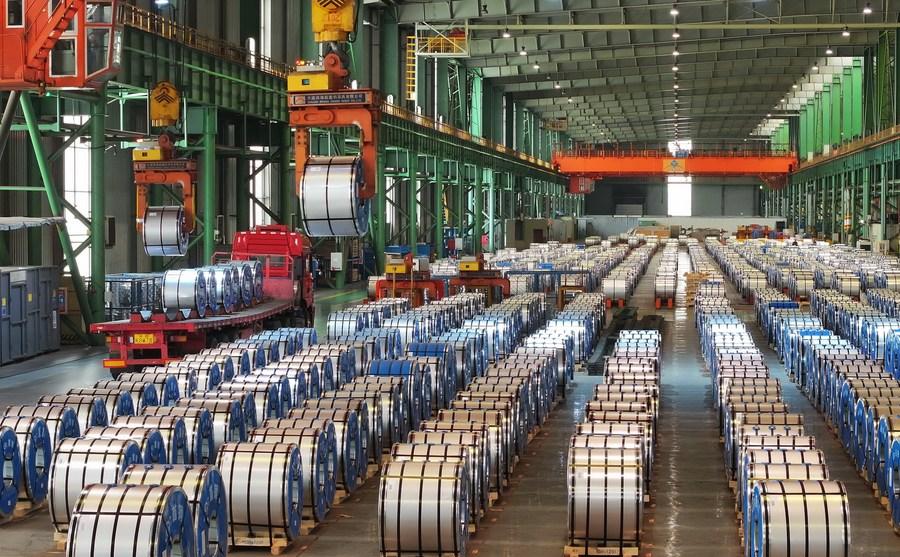

This aerial photo taken on July 22, 2023 shows a warehouse of Shougang Jingtang United Iron & Steel
China's top leadership has convened a crucial meeting that set the economic policy agenda for the rest of the year with clear macro policy steps to navigate new situations facing the country's "tortuous recovery."
Currently, China's economy is meeting with new difficulties and challenges, which mainly arise from insufficient domestic demand, difficulties in the operation of some enterprises, risks and hidden dangers in key areas, as well as a grim and complex external environment, according to the meeting held by the Political Bureau of the Communist Party of China (CPC) Central Committee on Monday.
The world's second-largest economy secured a 5.5-percent GDP expansion in the first half (H1) of the year -- quicker than 2022 and this year's first quarter, while certain indicators showed a trend of decline and fluctuations.
"We cannot perceive this round of recovery from an old perspective," said Liu Yuanchun, president of the Shanghai University of Finance and Economics. "Post-COVID recovery occurs in stages, and fluctuations in indicators and expectations are normal."
China's post-pandemic recovery is a "wave-like" and tortuous progress, with the country's long-term sound economic fundamentals remaining unchanged, the meeting noted.
Leveraging fiscal, monetary tools
To combat the challenges, the central leadership emphasized the need for precise and forceful macroeconomic regulation, focusing on strengthening counter-cyclical regulation and adopting more policy options.
The meeting called for the continuation of a proactive fiscal policy and a prudent monetary policy and leveraging the role of quantitative and structural monetary tools to support the real economy, scientific and technological innovation, and the development of micro, small, and medium-sized enterprises.
The mentioning of "counter-cyclical" adjustment signaled that the monetary policy would be intensified and the policy orientation is to stabilize growth, so there might be an increase in the intensity of credit supply in the future, said a research note by China International Capital Corporation Limited after the meeting.
"The proactive fiscal policy will continue to focus on helping enterprises overcome difficulties and promoting investment, while the monetary policy will adopt price-based instruments and focus on optimizing the structural monetary policy tools," said Feng Xuming, a Chinese Academy of Social Sciences (CASS) research fellow.
Boosting domestic demand
The CPC Central Committee has urged active expansion of domestic demand, particularly on bolstering consumption, and called for accelerating government investment to drive overall investment.
Consumption in key sectors such as automobiles, electronic products, and household items will be bolstered. Spending on services, including sports, leisure, culture, and tourism, is also encouraged, according to the meeting.
With a contribution of 77.2 percent to economic growth, consumption has played an increasingly prominent role in driving China's economy in H1.
China's top economic planner has mapped out measures to restore and expand consumption in a wide-ranging plan to bolster growth. Detailed plans on promoting the consumption of automobiles, electronic products, and household items have been unveiled this month.
Chen Lifen, a researcher at the Development Research Center of the State Council, stressed the need to expand domestic consumption to achieve development goals considering a lack of driving forces in global growth and a slowdown in international trade.
"With the gradual implementation of policies to expand domestic demand, investment and consumption are expected to maintain stable growth in the second half of the year, further enhancing the resilience and stability of China's economic development," said Chen.
The meeting stressed that government investment should better drive overall investment, with faster issuance and use of local government special-purpose bonds.
In H1, the country saw a slow issuance of special bonds, and there is still a quota of 1.6 trillion yuan (about 224.1 billion U.S. dollars) of bonds waiting to be issued in the second half, said Wen Bin, the chief economist at China Minsheng Bank. He expected that the issuance of special bonds would accelerate in the third quarter to support infrastructure investment and stabilize the economy.
Defusing risks to achieve high-quality growth
In pursuit of high-quality development, the CPC Central Committee stressed the importance of fostering strategic emerging industries and promoting the integration of the digital economy with advanced manufacturing and modern services.
The real estate market also received attention. The meeting called for concrete efforts to prevent and defuse risks in key areas and adjust and optimize real estate policies promptly in response to the new situation that "major changes have taken place in the relationship between supply and demand in China's real estate market."
"It is a precise judgment on the changes in the supply-demand relationship and the structure of China's real estate market under the new situation, sending a clear signal for timely adjustment and optimization of policies to promote the stable and healthy development of the real estate market," said Zou Linhua with the CASS.
Policy toolkits should be well utilized with city-specific measures to meet residents' essential housing demand and their needs for better housing, and advance the stable and sound development of the real estate market, according to the meeting.
China will likely adopt more supportive measures in the property sector in the rest of the year, which will stimulate residential purchasing and effectively alleviate risks for real estate enterprises, said Lian Ping, the chief economist at Zhixin Investment Research Institute.
Wen Bin with China Minsheng Bank pointed out that the real estate policies are still geared towards risk prevention, indicating that the goal of policy adjustments is to ease the overly strict policies in the previous stage and prevent risks from worsening.
"Real estate will not be used as a short-term means to stimulate the economy," Wen stressed.
